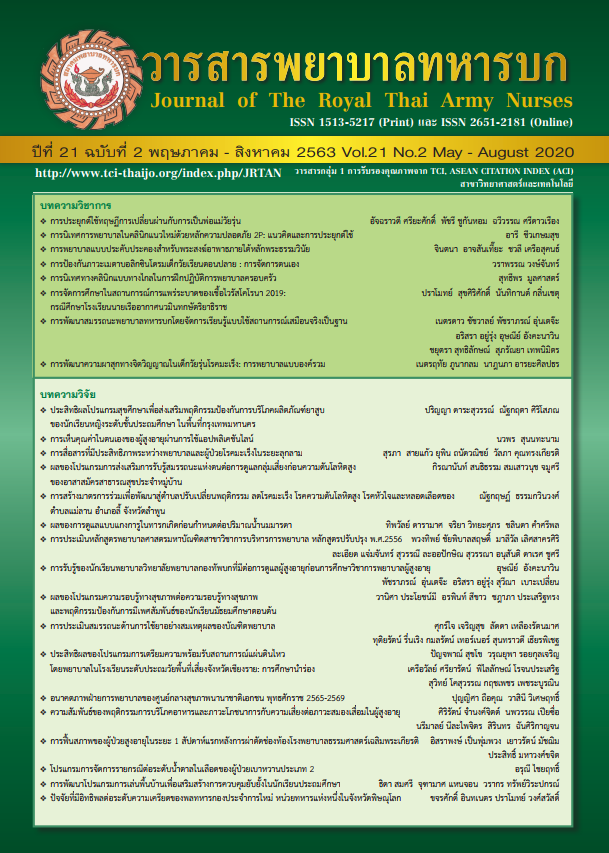A Randomized Crossover Study on the Effects of Inhaled Rice Paddy Herb Oil (Limnophila aromatica (Lam.) Merr.) on Autonomic Nervous System and Reaction Time on Healthy Volunteers
Keywords:
Limnophila aromatica, autonomic nervous system, reaction timeAbstract
Rice paddy herb, a characteristic odor vegetable is commonly used in Thai dishes and Asian indigenous system of medicine. This study aimed to evaluate the effects of rice paddy herb aerial part essential oil inhalation on autonomic nervous system and reaction time tasks among healthy volunteers using a randomized crossover design. Twenty-four healthy participants aged between 18 and 25 years were received sweet almond oil and rice paddy herb oil (8% v/v in sweet almond oil) by inhalation. ANS activities were recorded using BIOM7000 Patient Monitor. The simple and choice reaction tasks were performed on computer screen by the Deary-Liewald reaction time program. Data were analyzed using paired t-test with a significance level of .05. Simple reaction times to responses as well as choice reaction correct items and times were recorded. The results showed that the rice paddy herb oil statistically significantly decreased the systolic blood pressure, diastolic blood pressure and heart rate. For reaction time tasks, the rice paddy herb oil statistically significantly decreased the responded times in simple reaction time test. In summary, the rice paddy herb oil affected systolic and diastolic blood pressure as well as heart rate and it showed potential on the reaction response improvement among healthy participants.
Downloads
References
Hughes M. Olfaction, Emotion & the Amygdala: arousal-dependent modulation of long-term autobiographical memory and its association with olfaction: beginning to unravel the Proust phenomenon Impulse. The Premier Journal for Undergraduate Publications in the Neurosciences. 2004 Jun; 1(1): 1-58.
Bensafi M, Rouby C, Farget V, Bertrand B, Vigouroux M, Holley A. Autonomic nervous system responses to odours: the role of pleasantness and arousal. Chemical Senses. 2002; 27(8): 703-9
Riedel P, Jacob MJ, Müller DK, Vetter NC, Smolka MN, Marxen M. Amygdala fMRI signal as a predictor of reaction time. Frontiers in human neuroscience. 2016; 10: 516.
Sayowan W, et al. The harmonizing effects of citronella oil on mood states and brain activities. J Health Res. 2012; 26(2): 69-75.
Nuiden N, et al. The Effects of Cinnamomum porrectum Essential Oil Inhalation on Human Autonomic Nervous System and Emotional States. Journal of The Royal Thai Army Nurses. 2019; 20(2): 83-92. (in Thai)
Sayowan W, et al. The effects of jasmine oil inhalation on brain wave activies and emotions. J Health Res. 2013; 27(2): 73-77.
Deary I. J, Liewald D, Nissan J. A free, easy-to-use, computer-based simple and four-choice reaction time programme: the Deary-Liewald reaction time task. Behavior research methods. 2011; 43(1): 258-268.
Nanasombat S,Teckchuen N. Antimicrobial, antioxidant and anticancer activities of Thai local vegetables. Journal of Medicinal Plants Research. 2009; 3(5): 443-449.
Brahmachari G. Limnophila (Scrophulariaceae): Chemical and Pharmaceutical Aspects. The Open Natural Products Journal. 2008; 1: 34-43.
Philpott C, Goodenough P, Passant C, Robertson A, Murty G. The effect of temperature, humidity and peak inspiratory nasal flow on olfactory thresholds. Clinical otolaryngology. 2003; 29: 24-31
Llido L, Mirasol R. Comparison of body mass index based nutritional status using WHO criteria versus “Asian” criteria: report from the Philippines. PhilSPEN Online JParenter Enteral Nutr. 2011; 1-8.
Hummel T, Mohammadian P, Kobal G. Handedness is a determining factor in lateralized olfactory discrimination. Chemical senses. 1998; 23(5): 541-4.
Cain W, Testing olfaction in a clinical setting. Ear, nose, & throat journal. 1989; 68(4): 316-22.
Heuberger E, Hongratanaworakit T, Böhm C, Weber R, Buchbauer G. Effects of chiral fragrances on human autonomic nervous system parameters and self-evaluation. Chemical Senses. 2001; 26(3): 281-292.
Chang K. M, Shen C. W. Aromatherapy benefits autonomic nervous system regulation for elementary school faculty in Taiwan. EvidenceBased Complementary and Alternative Medicine. 2011; 1-7.
Hongratanaworakit T, Buchbauer G. Evaluation of the harmonizing effect of Ylang-Ylang oil on humans after Inhalation. Planta Med. 2004; 70: 632-636.
Chamine I, Oken B. S. Aroma effects on physiologic and cognitive function following acute stress: A mechanism investigation. The Journal of Alternative and Complementary Medicine. 2016; 22(9): 713-721.
Prasittivatechakool A. Alternative health and perspective to select without overlook. Journal of the Royal Thai Army Nurses. 2014; 15(3): 38-43. (in Thai)
Downloads
Published
How to Cite
Issue
Section
License
บทความหรือข้อคิดเห็นใดใดที่ปรากฏในวารสารพยาบาลทหารบกเป็นวรรณกรรมของผู้เขียน ซึ่งบรรณาธิการหรือสมาคมพยาบาลทหารบก ไม่จำเป็นต้องเห็นด้วย
บทความที่ได้รับการตีพิมพ์เป็นลิขสิทธิ์ของวารสารพยาบาลทหารบก
The ideas and opinions expressed in the Journal of The Royal Thai Army Nurses are those of the authors and not necessarily those
of the editor or Royal Thai Army Nurses Association.






